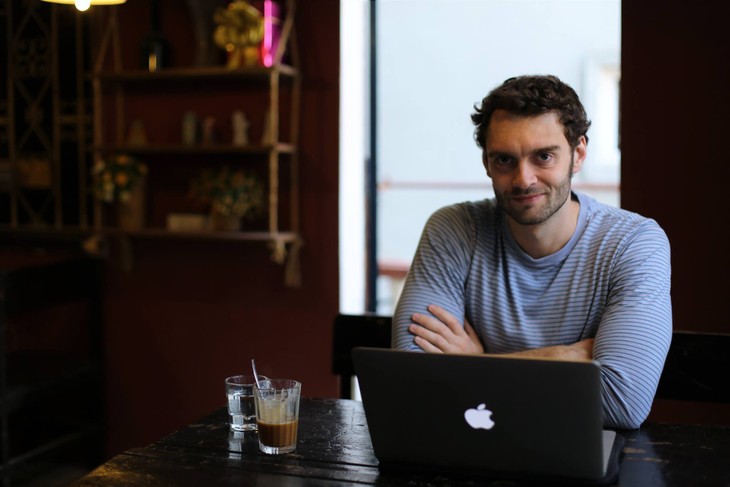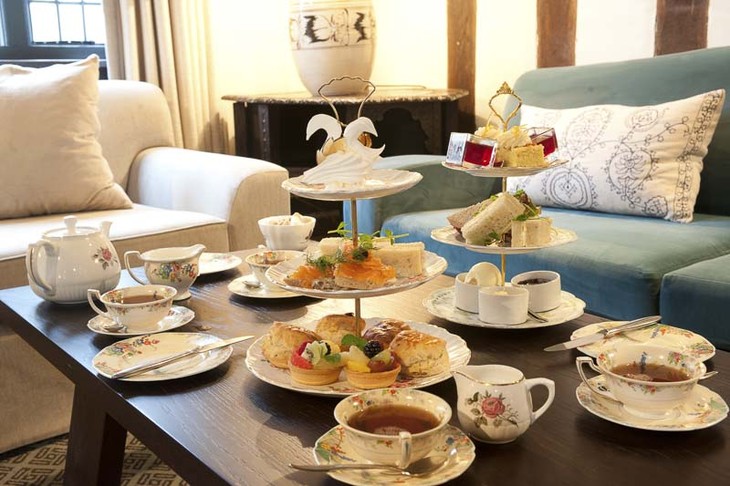
Joshua Zukas has been living in Vietnam for 2 years
My name is Josh and I’m from the United Kingdom. I’m actually from small village near London. And today I am going talk about tea culture in Britain.
So I would say that tea is an important part of British culture. Most people drink tea and I would say that they drink tea at several times during the day. And I think British people are famous for that: getting up in the morning and drinking tea. We are famous because we drink tea with fresh milk, which is different to almost every other country in the world. And the fact that we drink tea and we drink so much tea is an interesting sign of British culture. But what’s also interesting is the act of afternoon tea. That’s a very traditional practice and it’s only practiced in probably more wealthy families, though I think these days, everybody might do it, regardless of social class.

|
Traditionally, afternoon tea is served at 4pm. Of course there is tea but there are also a lot of snacks. In high society, for the wealthy area society, they will call it high tea. And it’s almost like a meal. Not only will there be tea but there will also be cakes, sandwiches and there will also be scones. Scones are a little bit like cakes, but they have less flavour and they’re less sweet because you eat scones with jam and cream. The cakes are normally small and served as individual bites. And then the sandwiches that you eat with it are also delicately cut. And normally quite basic. There are cucumber sandwiches, or maybe smoked salmon sandwiches or cream cheese sandwiches. It really does depend. And that’s the tea culture in Britain.
That’s really interesting info about UK tea culture. What about it’s history? When and where did that culture come from?
There is lots to say about tea culture and its very interesting history. We get most of our tea from our ex-colonies and I am talking about mainly India and Sri Lanka. So most of our tea comes from there. Tea culture in Britain is not very old, it's only a few hundred years old because before that there was no tea and people would drink beer. Both of them are very linked to British colonial history. Interestingly actually it’s a culture, although now it’s very important to British culture, it’s actually a culture that was taken from Asia because Asia has a much longer tea drinking culture than Europe.
So how has the act of drinking tea adapted to the British culture?
The act of drinking tea was actually taken from Asia and it came to Britain. And of course like every aspect of culture when you take it from an alien culture or culture outside your home, of course it is adapted. So the tea that we drink is very different from the tea they drink in India or the tea they drink in China and also of course the tea people drink in South East Asia.
The main big difference of course is, in Europe, we don’t have a very long tea drinking culture but we do have a very long dairy culture. So whereas it’s difficult to find fresh milk in India, South East Asia, and some parts of China, in Europe it’s an important part of our food culture: fresh milk, cheese and cream and these kinds of thing. This is so interesting, the way in which the tea culture taken from Asia has adapted to suit the British taste. We have a tradition of drinking milk so what we did is we mixed the milk in with the tea, which we found very bitter because we don’t really have a tradition of drinking bitter things.
The milk is there to add a little bit of flavour and texture to the drink but it’s true that the tea is the star of the show. The tea is the focus. Of course when you invite people to drink tea, that’s what you say: would you like a cup of tea? You don't say: would you like a cup of tea with milk? And it’s always assumed in Britain when you offer a cup of tea to some one, it’s always assumed that it's black tea, most of the time is English breakfast tea, and you always have milk in it. It’s very unusual for people to drink tea without milk in it.
It’s so popular that we don’t say milk tea; we say tea. Because it’s already assumed that milk is involved.
So when you invite guests to have some tea, you offer them milk tea. What about the tea set? Could you tell us about what British prepare for an afternoon tea?
It depends on the family but it’s also quite important - the equipment that you use for having high tea in the afternoon. One of the interesting features of the high tea is we have levelled plate. We have one plate at the bottom that we will have sandwiches. On top of that plate, so that’s not next to it, on top of that plate, we have another plate that we may have scones and then on top of that plate, we have another plate and that would probably have the cakes. So we joked that’s how we call it the high tea because we have high things: a plate on the top of the other. That’s where you take the cakes, or the scones or the sandwiches from. It’s those plates.
In traditional family there is a time for all of the family to get together and sit down and drink tea and eat sandwiches. The time is between lunch and dinner when you’re already a little bit hungry but you’re not yet ready for the main meal of the evening.
Wonderful tradition, at least for me, as I often get hungry in the afternoon!!!! One last question, what do you love best about your tea culture?
I think the nicest thing about tea in English culture is that, a little bit like tea in traditional Vietnamese culture, it’s always offered. Like, unless it’s very late at night, it’s always offered and it’s always something everybody can relate to. It doesn’t matter how rich you are or how poor you are, or your work area, or the country you come from, or even what your culture background is. Because England is multi-cultural so you have people who are British but maybe their ancestors are from India, Jamaica, South Africa, or whatever. But almost everybody would drink it and everybody will partake in the tea culture. So when you come to somebody’s house, it’s the most common thing for you to say: Would you like a cup of tea? We don’t say: would you like some water or would you like coffee. We say: would you like tea. And I think that’s quite nice as it transcends culture boundaries, it transcends social boundaries, because everybody, everybody participates.
Thank you so much, Josh, for your lovely talk about British tea culture. It’s been a pleasure for us to have you join us today on VOV24/7’s Culture Rendezvous. And that’s it for now. Join us next time for more special cultural traditions from around the world.